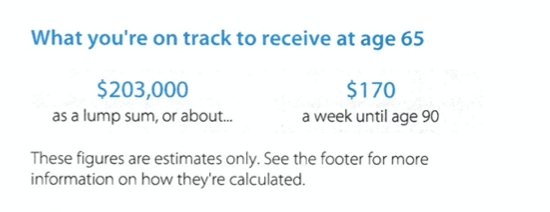What does the ‘KiwiSaver Retirement Projection’ on your KiwiSaver Statement mean?
If you are aged between 18 & 64, from this year, you will receive some more information on your annual KiwiSaver Statement. This ‘Retirement Projection’ information is a legislative requirement, and is prescribed by the regulators.
It is important to note that this is only for your KiwiSaver.
To get a proper analysis of how much money you will have available in retirement, and how you could draw that down and more importantly – how long your money will last, contact us at Moneyworks at advice@moneyworks.co.nz. We will work with you look at the options of developing a financial plan for you that shows you your retirement projections in more detail.
The important things to remember about these projections are:
· Your pay will increase by 3.5% each year and your contributions will increase in line with your pay (including voluntary contributions you may make in addition to contributions automatically deducted from your pay). For example, a $200 per month contribution today will be a $207 per month contribution next year, a $214 per month contribution the year after and so on.
· If you make regular voluntary contributions (for example a regular direct debit) you will continue making these each year until you reach 65.
· If you make any one-off payments during the year, you’ll continue to do this every year until you reach 65 (these will be capped at $1,500 in total per year – this ensures any large one-off payments you’ve made that might not be repeated don’t overstate your projection).
· You take no savings suspensions – where you stop contributions for a period of time.
· No amounts are withdrawn for first home purchase or financial hardship, or (for estimating the weekly amount) as a lump sum after you reach age 65.
· The Government contribution you earned in the past year (the current statement period) will continue to be paid each year until you reach age 65. For example, if you qualified for the full Government contribution of $521, the estimate will include this for every year. If you only qualified for a portion of the contribution, that same portion will be applied every year.
· You stay in the same fund or fund mix until you are 65.
· The rate of return is based on your fund type, as shown in the table below. The rates of return are:
· After tax of 28%. This is the highest and most common tax rate for KiwiSaver members.
· After fees. The fees used are an average for your fund type and don’t reflect the actual fees you paid
· After 65, your balance will earn a 2.5% rate of return each year (after fees and tax).
· The projections are adjusted for inflation, to enable you to assess the buying power of your money at the time you would receive it. The inflation assumption is currently 2% per annum.
· For the weekly amount, you will make regular withdrawals over 25 years (ie until age 90) until your balance reaches zero.
Return after fees and tax have been deducted
| Type of Fund | Mix % in growth assets | Assumed rate of return (after fees and tax) |
| Defensive | 0.00 - 9.90% | 1.50% |
| Conservative | 10.00% - 34.90% | 2.50% |
| Balanced | 35.00% - 62.90% | 3.50% |
| Growth | 63.00% - 89.90% | 4.50% |
| Aggressive | 90.00% - 100.00% | 5.50% |
| Life cycle option - under 50 year olds | 3.50% | |
| Life cycle option - over 50 year olds | 2.50% |
* Most funds are a mix of income assets (cash and bonds) and growth assets (shares, property and other). Your fund might have a different name or be a single sector fund, or you might be in multiple funds. In these cases your provider must use the rate of return that represents the mix of growth and income assets you have. For example, if you are in an ‘International Equities’ fund that has over 90% of investments in international equities (shares), your provider would use the 5.5% return assumption. Your statement will show the rate of return your provider has applied.
More information on how your projections are calculated is available at https://www.fma.govt.nz/investors/resources/kiwisaver-projections


